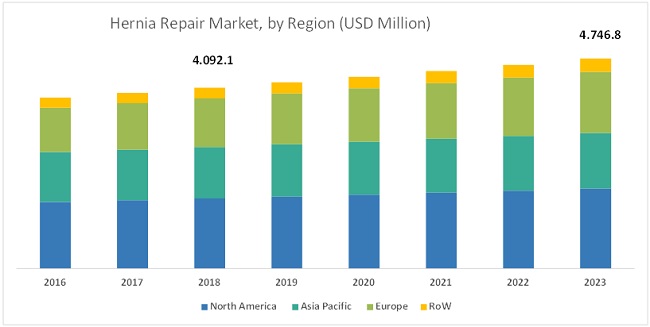The Research Report on “Hernia Repair Market by Product (Mesh (Synthetic, Biologic), Mesh Fixation (Suture, Tack and Glue Applicator)), Surgery Type (Inguinal, Incisional/Ventral, Umbilical, Femoral), and Geography (America, Europe, Asia Pacific) – Forecast”, is projected to reach USD 4.75 billion by 2023 from USD 4.09 billion in 2018, at a CAGR of 3.0% during the forecast period.
Driver: Increasing hernia prevalence;
The growing prevalence of hernia is the main driving force for the growth of the hernia mesh repair market. This is mainly attributed to the overall increase in population, specifically geriatric and obese population, and improvements in healthcare systems that have enabled the early detection and treatment of hernia.
Age contributes significantly to the risk of hernia by retarding the body’s capabilities and natural healing abilities over time. According to a registered study in the UK, the prevalence of hernia was found to increase with age, from 5% in the 25¡V34 age group to:
– 10% in the 35-44 age group
– 18% in the 45-54 age group
– 24% in the 55-64 age group
– 31% in the 65-74 age group
In addition, the incidence of hernia among men aged 75 years and above was found to be 45%. Consequently, the growth in aging population can be expected to boost overall hernia incidence in the coming years.
Download PDF Brochure:
https://www.marketsandmarkets.com/pdfdownloadNew.asp?id=203245450
Industry Segmentation In Detailed:
The hernia mesh segment is estimated to account for the largest share of the hernia repair market
On the basis of product, the hernia mesh market is segmented into mesh and mesh fixators. A mesh is used for reinforcing weak spots in the muscle while repairing the hernia. Mesh fixators are used to fix the mesh in its place to avoid displacement. In 2018, the hernia mesh segment is expected to account for the largest share of the market. This large share can be attributed to the higher prices of meshes compared to mesh fixators.
In 2018, tack applicators to account for the largest share of the mesh fixators market
The hernia mesh fixators market is segmented into sutures, tack applicators, and glue applicators. Among these, sutures is the most common type of mesh fixator, followed by tack. However, due to the higher price of tacks, the tack applicators segment is expected to account for the largest share in the mesh fixators market in 2018. While the rising adoption of surgical glue as mesh fixators makes glue applicators the fastest growing segment of the mesh fixators market.
Request Sample Pages: https://www.marketsandmarkets.com/requestsampleNew.asp?id=203245450
Leading Key Players and Analysis:
The major players in the hernia repair market profiled in this report are Covidien ( Part of Medtronic) (Ireland), Ethicon (Part of Johnson & Johnson) (US), B. Braun (Germany), C.R. Bard (Part of Becton Dickinson) (US), W. L. Gore (US), LifeCell (Part of Allergan) (Ireland), Maquet (Part of Getinge) (Sweden), Cook Medical (US), Integra (US), DIPROMED (Italy), FEG (Germany), Cousin Biotech (France), Herniamesh (Italy), Aspide Medical (France), TransEasy Medical (China), and Via Surgical (Israel).
Medtronic (Ireland): Medtronic is a multinational medical technology company that manufactures and markets products for alleviating pain and restoring health. The company’s products are used by hospitals, clinics, third-party healthcare providers, distributors, and other institutions (including governmental healthcare programs and group purchasing organizations).
The company has a strong presence in the US market and is expanding its reach in emerging markets. For instance, in 2016, the company opened its regional headquarters in Singapore to improve its market presence in the Asia Pacific market.
Medtronic offers hernia repair products through its subsidiary Covidien. The acquisition of Covidien in January 2015 supported Medtronic in accelerating its therapy innovation, globalization, and economic value.
Geographical Analysis in Detailed:
The global hernia repair market is segmented into four major regions, namely, North America, Europe, the Asia Pacific, and the Rest of the World (RoW). In 2018, North America is estimated to account for the largest market for hernia mesh devices. The large share of North America in this market can be attributed to the strong demand for and adoption of hernia repair in the US, presence of a large pool of hernia patients, and an efficient and favorable healthcare system are supporting the growth of the hernia repair market in North America.
Speak to Analyst: https://www.marketsandmarkets.com/speaktoanalystNew.asp?id=203245450



